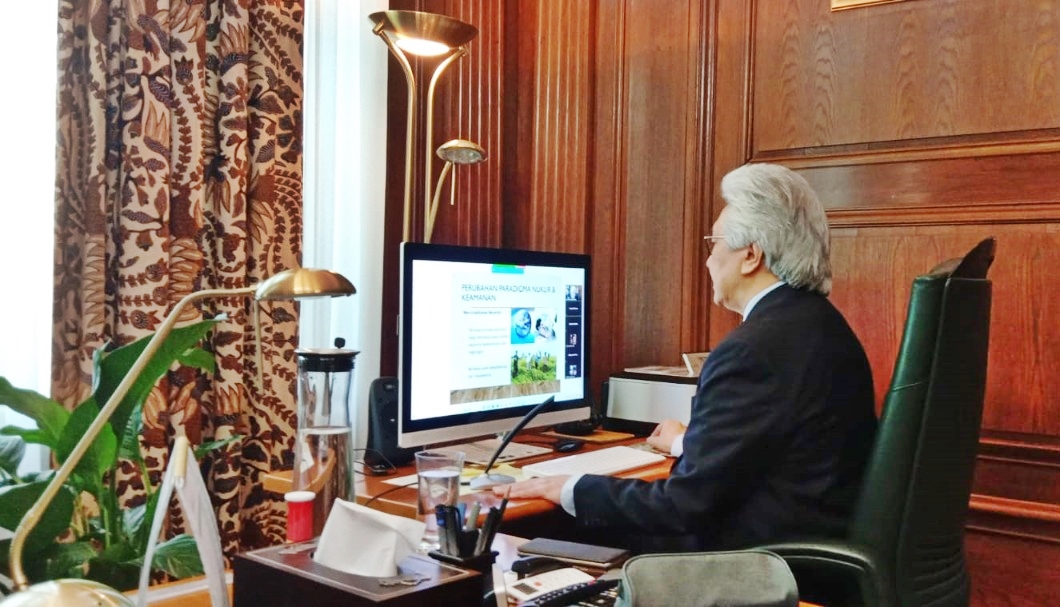International cooperation in the use of nuclear technology for peaceful purposes needs to be continuously campaigned, it is intended to provide direct benefits for national development and orientation to the people’s welfare. This is an action that is in line with the vision of a national foreign policy launched by the Indonesian government.
Bilateral and multilateral diplomacy is directed at providing a concrete and direct impact on society in the form of increasing economic levels and supporting various strategic sectors of national development. This was conveyed by the Indonesian Ambassador to Austria and the United Nations, Darmansjah Djumala in the webinar of the Indonesian Nuclear Society/HIMNI with the theme “Grounding Nuclear Diplomacy”
The webinar was attended by members of the Indonesian nuclear community (HIMNI), government agencies related to nuclear and the academic community of various universities.
“Currently there has been a paradigm shift in nuclear use in line with the expansion of the concept of security. Previously nuclear was understood only in the narrow (traditional) context of security, namely for weaponry purposes. Now nuclear applications are being developed in a broader context, namely the scope of security that is broader (non-traditional), namely to build various strategic sectors such as food security, energy security and a stronger economic foundation, “said Darmansjah Djumala, in his official statement, Friday (26/02/2021).

“Indonesia’s active role in carrying out diplomacy on nuclear utilization cooperation is a member of the International Atomic Energy Agency (IAEA),” he explained.
Through a down-to-earth diplomacy approach, Indonesia encourages IAEA cooperation with its member countries to be able to answer real challenges in various development sectors at the national level.
“The role of Indonesia’s leadership in the capacity of the Chairmanship of the IAEA Board of Governors in 2017-2018 has had a real impact on strengthening nuclear application technical cooperation which has a much greater priority than other IAEA technical programs that are supervisory in nature,” he explained.
As is well known, Indonesia has benefited from this diplomacy of nuclear technical cooperation, in the form of mastery of technology and the ability to produce various research products for nuclear technology applications such as superior varieties of rice and soybeans that have the potential to strengthen national food security, radiopharma products for cancer treatment that can improve the quality of public health, providing irradiation services for food products that increase the competitiveness of national export products, to nuclear use for controlling the Aedes Aegypti mosquito population using sterile insect techniques.
Indonesia was appointed by the IAEA to host two Collaborating Centers in the field of plant mutation and non-destructive testing, which regularly provide training services for human resources in other countries under the support of the IAEA program. This training program is a form of South-South cooperation regulated in the Indonesia-IAEA Practical Arrangement since 2018.
“As a member country that has the ability to master nuclear technology, Indonesia contributes to assisting other member countries in utilizing technology that has been mastered, including by facilitating the development of human resource capacity for researchers from other countries through training, fellowships and scientific visits, as well as providing assistance in implementing technical cooperation projects. IAEA in other developing countries,” said Djumala.
It is necessary to note that Indonesia is currently supporting various new initiatives in the use of nuclear technology in the IAEA, such as becoming a pilot country for the plastic waste management program (NUTEC Plastic) and actively participating in collaborative networks for handling zoonotic (animal) diseases which have become new challenges in the century. -21.
All of the nuclear cooperation programs with the IAEA and fellow members that have been carried out so far are believed to be in line with the down-to-earth diplomacy strategy that provides direct benefits to the Indonesian people.






